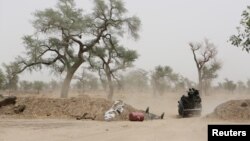More than 100 people have been tortured by Cameroon security forces and held incommunicado in the past four years on suspicion of involvement with the Nigeria-based Islamic extremist group Boko Haram, according to a report released Thursday by Amnesty International.
Such treatment has become routine and is practiced with impunity, and it violates both national and international law, the group said. In the majority of cases, people were held on little or no evidence.
People are usually caught up in sweeping arrests after a large attack by Boko Haram, whose eight-year insurgency has killed more than 20,000 people and displaced millions in Nigeria and neighboring countries, including Cameroon.
The extremists have killed more than 1,500 civilians in Cameroon's Far North region since 2014, according to Amnesty International. Cameroon, Chad and Niger all contribute to a multinational force to combat the insurgency.
"We have always said security forces are pursuing the right cause," Amnesty International's deputy regional director for West and Central Africa, Stephen Cockburn, told The Associated Press. However, "in this type of combat you need trust in the population to get the type of intelligence and information that you need. And if you are seen as a force that preys on the population rather than protects it, that's not going to help your campaign against Boko Haram."
The rights group has called on Cameroon's government to end incommunicado detention and investigate all allegations of torture and other cruel treatment.
Cameroon's government has not responded to the new report.
"What they are doing in Cameroon is way beyond the law. It should be subjected to criminal investigation," Cockburn said.
Most of the 101 cases investigated by Amnesty International involved men 18 to 45 years old, though the group documented the mistreatment of some women, children and people with mental and physical disabilities.
On average, those interviewed by the rights group were held without access to family or lawyers for about 32 weeks, with some held for up to two and half years, the report said.
"Detainees were severely beaten with various objects including electric cables, machetes and wooden sticks," suspended from poles and subjected to drowning, the report said, adding that many were deprived of food, water and medical attention.
More than 30 people interviewed said they had witnessed deaths after torture.
Many cases were traced to two sites: the headquarters for the Rapid Intervention Battalion in Salak and another facility in Yaounde called "Lac" and run by the General Directorate of External Research, Amnesty International said.
Though no one interviewed told the rights group of direct involvement by agents of other countries, some described seeing white men speaking English at the Salak base on several occasions.
Several countries provide military assistance to Cameroon, including the United States and France. Amnesty International called on both governments to investigate the degree to which its personnel may have been aware of the practices carried out.
A letter from the U.S. Embassy in Cameroon to Amnesty International said it takes such allegations seriously, and "in accordance with the Leahy Law, do not furnish assistance to any security force unit if the secretary of state has credible information that such a unit has committed a gross violation of human rights.''
Report: Cameroon Torturing Suspects in Boko Haram Fight

DAKAR —











